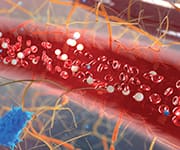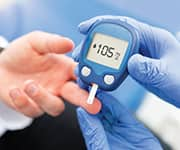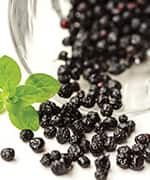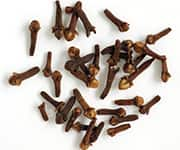Life Extension Magazine.
It’s not just diabetics who have to worry about their blood glucose levels.
According to the National Diabetes Statistics Report, an estimated 38% of Americans aged 18 years or older have blood glucose levels that are higher than normal… but not high enough to meet the threshold for type II diabetes.1
Our longstanding position is that anyone with less-than-optimal glucose, insulin and hemoglobin A1c (HbA1c) should aggressively intervene to optimize these glycemic markers.
Scientists have identified two plant extracts that can help maintain normal blood sugar levels, particularly after meals when spikes typically occur.
In human trials, a clove extract and a maqui berry extract2-5 each helped prevent harmful after-meal leaps in blood sugar.
These extracts can aid in maintaining healthy after-meal blood glucose levels.
The Danger of Elevated Blood Sugar
More than 48% of all U.S. adults aged 65 and over have prediabetes. About 25% have a formal diagnosis of type II diabetes.1
Those with prediabetes may have normal resting levels of glucose, but their levels can get out of control after a meal. These cases often go unnoticed because they’re not apparent on standard fasting blood tests.
That’s a huge problem. After-meal elevated glucose levels alone are associated with higher rates of cardiovascular disease, impaired cognitive function, and death.6-14 Almost a third of those with prediabetes could go on to develop diabetes within five years if no corrective actions are taken.15
Benefits of Plant Extracts
Higher intake of polyphenols, health-promoting compounds found in plants, is associated with protection from disease. Low polyphenol intake is associated with increased risk of chronic disease, including type II diabetes.4
Two specific polyphenol-rich plant extracts have been found to have beneficial effects on the control of glucose levels, particularly following a meal: maqui berry extract and clove extract.
Maqui Berry Extract
Maqui berry is a fruit native to South America. Extracts of these berries are high in polyphenols known as delphinidins.16
These nutrients have been shown to lower after-meal glucose levels. They do this by stimulating a peptide produced in the intestines that improves glucose metabolism.16,17
A study published in 2022 in the medical journal Frontiers in Nutrition found that a single dose of maqui berry extract before intake of sugars was associated with a decreased risk of high blood glucose levels in people with prediabetes.5
Patients showed reductions of the risk of dysglycemia (abnormal blood sugar levels) at the different doses tested, with the greatest impact seen with the highest dose of 180 mg.
In another human study, 200 mg of maqui berry extract taken before a meal helped lower after-meal glucose by more than 15% while also reducing after-meal insulin levels.3 (Excess secretion of insulin is associated with insulin resistance and future diabetic risks.)
Another study of subjects with a new diagnosis of prediabetes2 found that 180 mg of maqui berry extract significantly reduced levels of HbA1c (hemoglobin A1c) over 90 days.
After-Meal Glucose Control
Elevations of blood sugar following a meal are associated with poor health outcomes.
Scientists have found that polyphenol-rich clove and maqui berry extracts help control blood glucose, reducing after-meal spikes.
In human studies, maqui berry extract reduced high glucose levels after meals in those with prediabetes.
A clove extract lowered after-meal glucose levels in subjects with prediabetes and healthy adults with normal fasting glucose levels. It also reduced fasting glucose in prediabetics.
HbA1c is a commonly used blood marker of long-term blood glucose control. Lower levels indicate better long-term glucose control and less risk of diseases related to elevated glucose levels.
Overall, these studies suggest that an early intervention with maqui berry extract might help prevent prediabetes from progressing into full-blown diabetes.
Clove Extract
Cloves are dried flower buds of the Syzygium aromaticum tree. They have been widely used as a spice for centuries.
A clove extract has been produced that is standardized to at least 30% total polyphenols, a powerful mixture of bioactive compounds.18-20
The most compelling evidence of blood sugar control using clove extract was seen in a clinical trial published in 2019.4 This pilot study enrolled healthy young adults with normal fasting glucose levels and prediabetics with elevated fasting glucose.
All subjects were given 250 mg of clove extract daily, following a meal, for 30 days. On various days during this month, subjects had their blood glucose levels tested before and after a meal.
The extract led to improvements in both groups as follows:
- Reduced after-meal blood glucose levels by 22% in those with normal fasting glucose, and
- Reduced after-meal blood glucose levels by 27% in prediabetics with elevated fasting glucose.
In the group with prediabetes, the clove extract also helped maintain healthy levels of glucose throughout the day. That means their fasting glucose levels were also significantly reduced.
Cell culture experiments reveal three ways that clove extract4 helps maintain normal blood glucose and prevent after-meal spikes:
- It enhances uptake of glucose into muscle cells by 63%,
- It inhibits excess production of glucose by liver cells, and
- It reduces the activity of two digestive enzymes that break down more complex sugars such as starch, preventing a spike in glucose.
Taking clove and maqui berry extracts together may reduce after-meal glucose spikes and help with overall glucose control.
Summary
Typical aging people have higher than ideal levels of glucose, insulin, and A1C.
Clove extract and maqui berry extract have been shown to reduce after-meal blood glucose levels in individuals with prediabetes.
Even in adults with normal fasting glucose, clove extract reduces after-meal glucose levels.
If you have any questions on the scientific content of this article, please call a Life Extension Wellness Specialist at 1-866-864-3027.
References
- Available at: https://www.cdc.gov/diabetes/data/statistics-report/index.html. Accessed August 22, 2022.
- Alvarado J, Schoenlau F, Leschot A, et al. Delphinol(R) standardized maqui berry extract significantly lowers blood glucose and improves blood lipid profile in prediabetic individuals in three-month clinical trial. Panminerva Med. 2016 Sep;58(3 Suppl 1):1-6.
- Hidalgo J, Flores C, Hidalgo MA, et al. Delphinol(R) standardized maqui berry extract reduces postprandial blood glucose increase in individuals with impaired glucose regulation by novel mechanism of sodium glucose cotransporter inhibition. Panminerva Med. 2014 Jun;56(2 Suppl 3):1-7.
- Mohan R, Jose S, Mulakkal J, et al. Water-soluble polyphenol-rich clove extract lowers pre- and post-prandial blood glucose levels in healthy and prediabetic volunteers: an open label pilot study. BMC Complement Altern Med. 2019 May 7;19(1):99.
- Olivera-Nappa A, Contreras S, Tevy MF, et al. Patient-Wise Methodology to Assess Glycemic Health Status: Applications to Quantify the Efficacy and Physiological Targets of Polyphenols on Glycemic Control. Front Nutr. 2022;9:831696.
- Available at: https://www.health.ny.gov/diseases/conditions/diabetes/prediabetes/. Accessed June 22, 2022.
- Abbatecola AM, Rizzo MR, Barbieri M, et al. Postprandial plasma glucose excursions and cognitive functioning in aged type 2 diabetics. Neurology. 2006 Jul 25;67(2):235-40.
- Barclay AW, Petocz P, McMillan-Price J, et al. Glycemic index, glycemic load, and chronic disease risk—a meta-analysis of observational studies. Am J Clin Nutr. 2008 Mar;87(3):627-37.
- Cavalot F, Petrelli A, Traversa M, et al. Postprandial blood glucose is a stronger predictor of cardiovascular events than fasting blood glucose in type 2 diabetes mellitus, particularly in women: lessons from the San Luigi Gonzaga Diabetes Study. J Clin Endocrinol Metab. 2006 Mar;91(3):813-9.
- Ceriello A. Postprandial hyperglycemia and diabetes complications: is it time to treat? Diabetes. 2005 Jan;54(1):1-7.
- Garcia-Carretero R, Vigil-Medina L, Mora-Jimenez I, et al. Cardiovascular risk assessment in prediabetic patients in a hypertensive population: The role of cystatin C. Diabetes Metab Syndr. 2018 Sep;12(5):625-9.
- Huang Y, Cai X, Mai W, et al. Association between prediabetes and risk of cardiovascular disease and all cause mortality: systematic review and meta-analysis. BMJ. 2016 Nov 23;355:i5953.
- Mijajlovic MD, Aleksic VM, Sternic NM, et al. Role of prediabetes in stroke. Neuropsychiatr Dis Treat. 2017;13:259-67.
- Nathan DM, Davidson MB, DeFronzo RA, et al. Impaired fasting glucose and impaired glucose tolerance: implications for care. Diabetes Care. 2007 Mar;30(3):753-9.
- Available at: https://www.cdc.gov/diabetes/prevention/about-prediabetes.html. Accessed August 23, 2022.
- Alvarado JL, Leschot A, Olivera-Nappa A, et al. Delphinidin-Rich Maqui Berry Extract (Delphinol(R)) Lowers Fasting and Postprandial Glycemia and Insulinemia in Prediabetic Individuals during Oral Glucose Tolerance Tests. Biomed Res Int. 2016;2016:9070537.
- Kato M, Tani T, Terahara N, et al. The Anthocyanin Delphinidin 3-Rutinoside Stimulates Glucagon-Like Peptide-1 Secretion in Murine GLUTag Cell Line via the Ca2+/Calmodulin-Dependent Kinase II Pathway. PLoS One. 2015;10(5):e0126157.
- Issac A, Gopakumar G, Kuttan R, et al. Safety and anti-ulcerogenic activity of a novel polyphenol-rich extract of clove buds (Syzygium aromaticum L). Food Funct. 2015 Mar;6(3):842-52.
- Nm J, Rm R, G G, et al. Beyond the flavour: a de-flavoured polyphenol rich extract of clove buds (Syzygium aromaticum L) as a novel dietary antioxidant ingredient. Food Funct. 2015 Oct;6(10):3373-82.
- Jose S, Ratheesh M, Asha I, et al. Hepatoprotective effect of clove bud polyphenols (Syzygium aromaticum L.) (Clovinol®) by modulating alcohol induced oxidative stress and inflammation. Journal of Food Research. 2018;7(1):10-20.







